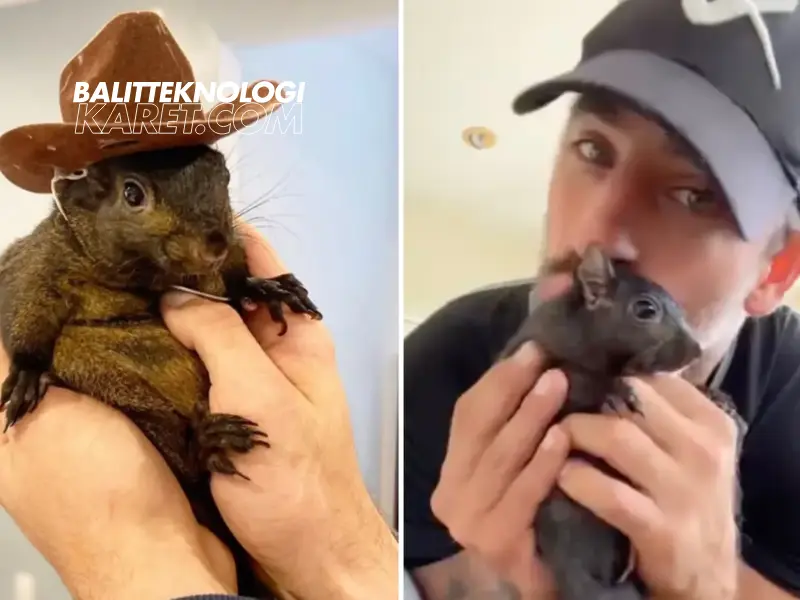Peanut the squirrel-a social media sensation and beloved companion to Mark Longo-was recently seized by wildlife authorities, sparking outrage among fans and animal lovers alike. This tiny creature, known for her playful antics and unique bond with her rescuer, has touched the lives of thousands online. But now, Peanut’s story has taken a dramatic turn as state officials step in, citing concerns about public safety and legal compliance.
Supporters are rallying, petitions are circulating, and the demand for Peanut’s safe return grows louder by the day. But what’s the real story behind her seizure, and what could this mean for others who share their lives with rescued wildlife? Join us as we dive into the details, exploring the legal, ethical, and emotional sides of Peanut’s journey and what might happen next in her fight for freedom.
Background of Peanut
Peanut, affectionately known as the squirrel with a story, was rescued in a moment of compassion that would eventually make him a beloved figure online. Originating from humble beginnings, Peanut was found as a young, orphaned squirrel by Mark Longo. Seeing the little creature’s need for care and shelter, Longo took him in, setting the stage for an inspiring journey. From an early stage, Peanut’s unique personality and Longo’s dedicated care led to an inseparable bond that would eventually captivate audiences on social media.
In the days that followed, Peanut’s rise to fame came naturally. Photos and videos shared on platforms like Instagram and TikTok showcased his playful nature, attracting viewers who resonated with Peanut’s journey from rescue to recovery. People around the world started following Peanut’s daily antics, and he became a social media sensation. This rise to popularity was fueled by the heartwarming connection between Peanut and his rescuer, Mark Longo, who treated him with the love and care that most would reserve for a pet.
However, this heartwarming story took an unexpected turn with a sudden seizure by authorities. On specific date, officials from the New York State Department of Environmental Conservation (DEC) intervened, citing New York’s laws prohibiting the ownership of wild animals as pets. The circumstances were both shocking and emotional for Peanut’s fans and his owner, Mark Longo, who had built a deep bond with the squirrel. During the seizure, other animals in Longo’s care were also affected, including a raccoon named Fred, which heightened the public’s reaction and led to questions regarding the rigid wildlife regulations in the state.
Legal and Ethical Considerations
The seizure of Peanut raised critical legal and ethical issues about wildlife ownership in New York. Under state laws, keeping wild animals such as squirrels and raccoons as pets is strictly controlled due to health concerns, including risks related to rabies. The DEC highlighted these rules as a way to protect both the public and animals from potential harm. In response, Longo began efforts to secure certification for Peanut as an educational animal, which would allow him to continue caring for Peanut legally. This step aims to balance the regulatory requirements with Peanut’s welfare, a move supported by many of Peanut’s fans.
Mark Longo’s pursuit of legal certification for Peanut as an educational animal has been seen as a conscientious effort to bridge the gap between animal welfare and state regulations. As Longo worked with legal advisors, many advocates and fans began raising awareness of the issue, believing that Peanut’s case could set a precedent for others in similar situations, where compassionate pet ownership may conflict with current laws.
Public Reaction
The seizure of Peanut ignited an outpouring of support and sympathy from his followers and animal rights advocates alike. Outcry from Peanut’s fans was immediate, with many expressing shock and sadness over the event. Social media became a central stage for Petition drives and campaigns, with followers calling for Peanut’s safe return to Longo. The incident also drew responses from animal welfare organizations, which voiced concerns about the application of wildlife laws to rescued animals who might otherwise face a difficult fate.
The DEC issued statements to clarify their stance, explaining that while they sympathized with the public’s affection for Peanut, their primary responsibility was to uphold public health and wildlife safety regulations. Ongoing investigations into the case have sparked a debate on how best to balance safety regulations with the well-being of animals who find their way into human care.
Current Status and Future Implications
As of the latest update, Peanut’s condition and whereabouts remain under close watch. Longo and his legal team continue to work with state authorities, exploring the potential for Peanut’s certification as an educational animal, which could allow him to stay with Longo permanently. Potential legal outcomes range from Peanut’s eventual return to Longo under specific conditions, to possible relocation if the certification is denied. This case has sparked a wider conversation on the future of exotic pet ownership, highlighting the need for updated laws that recognize unique cases of animal rescue and care.
The broader implications for wildlife conservation also cannot be ignored. Peanut’s story has raised awareness about the responsibilities and complexities of owning rescued animals, particularly species typically regarded as wild. This case may influence future legislative decisions, paving the way for compassionate guidelines that protect both animals and the people who care for them.
The situation surrounding Peanut serves as a powerful reminder of the delicate balance between animal welfare and legal obligations. This story not only illustrates the heartfelt connection between humans and rescued animals like Peanut, but it also highlights the importance of developing regulations that align with ethical pet ownership. As Peanut’s journey continues, many hope for a resolution that allows him to remain with Longo while respecting New York State’s wildlife policies.
